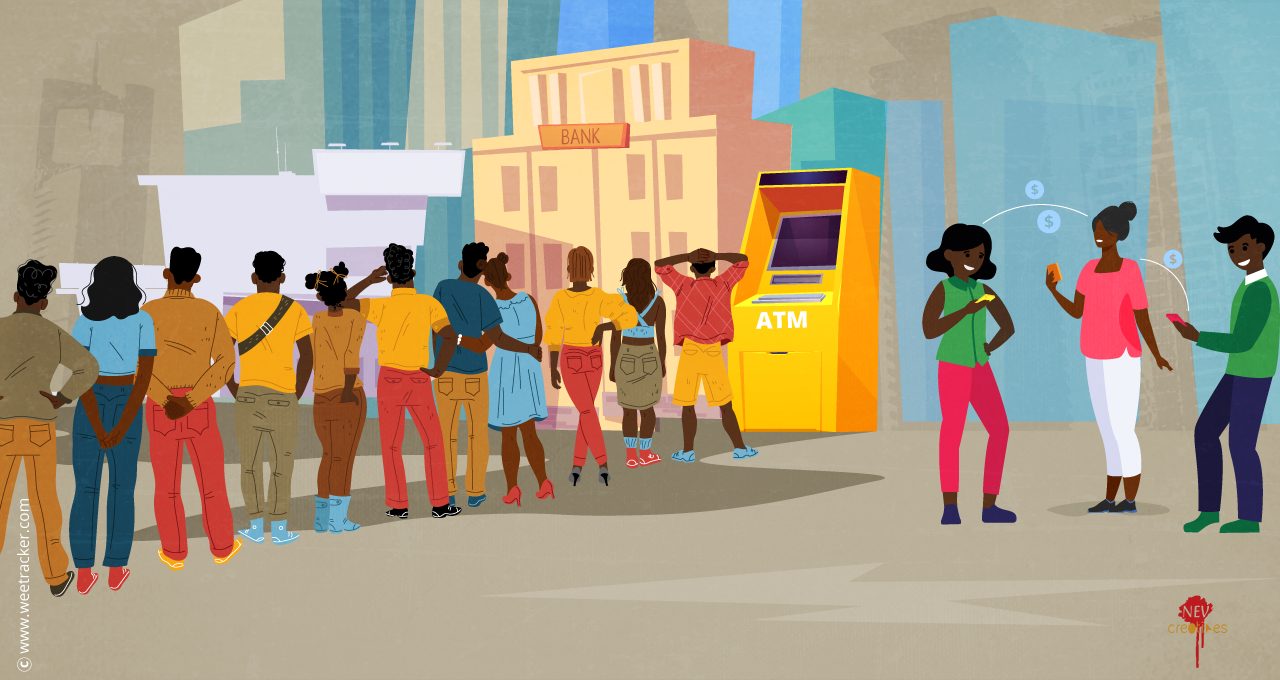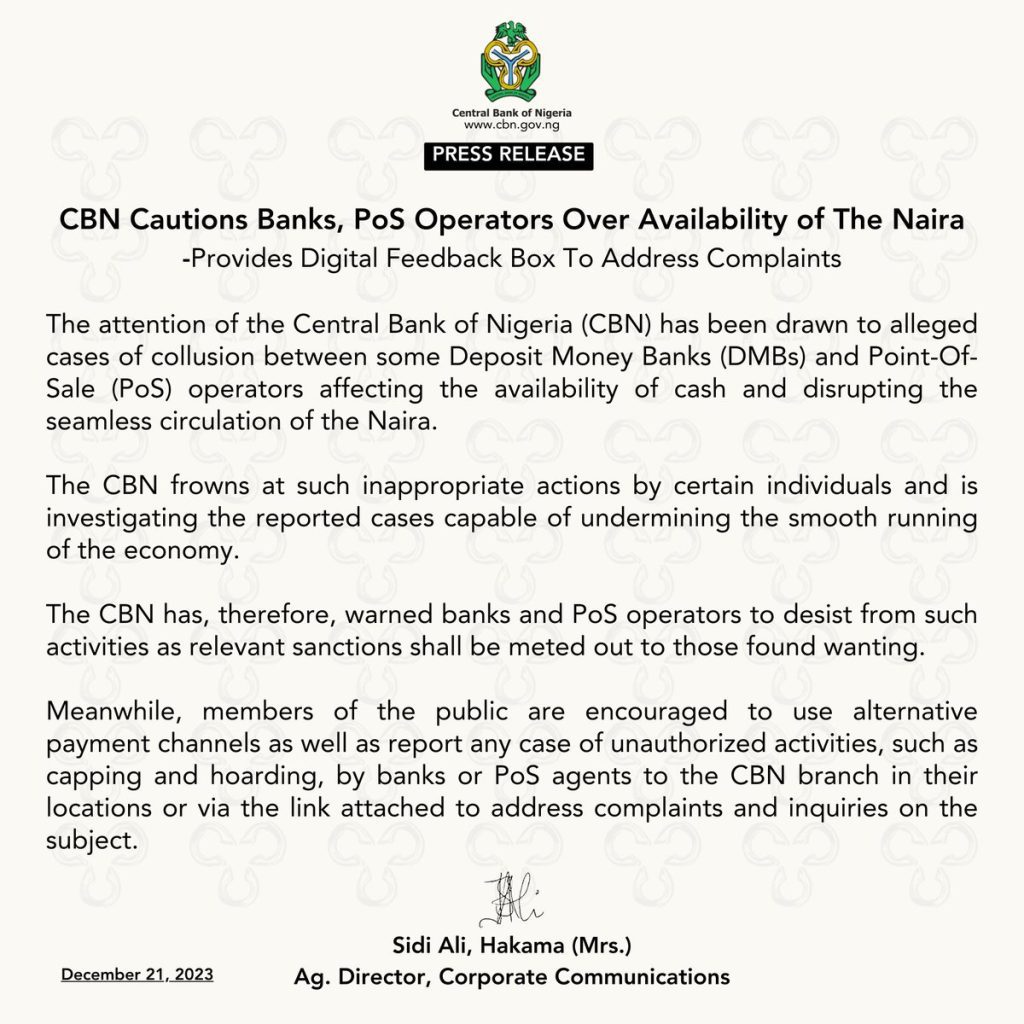Nigeria’s Apex Bank Points Finger At Fintech Agents & Banks Over Latest Cash Crisis

The Central Bank of Nigeria (CBN) has raised concerns over the reported collusion between Deposit Money Banks (DMBs) and Point-Of-Sale (POS) operators. The alleged connivance has resulted in a shortage of cash, stifling the circulation of the Naira across the country as the holiday season kicks in.
Expressing strong disapproval of such actions, the banking industry regulator has initiated investigations into these reported cases. The bank emphasized the potential adverse impact of these activities on the nation’s economy and warned both banks and POS operators to cease such practices immediately. The cash crunch that gripped Nigeria earlier this year reportedly cost the country’s economy an estimated USD 43 B.
“The CBN has, therefore, warned banks and POS operators to desist from such activities as relevant sanctions shall be meted out to those found wanting, “ reads a statement signed by Sidi Ali Hakama, the bank’s Acting Director of Corporate Communications.
“Meanwhile, members of the public are encouraged to use alternative payment channels as well as report any case of unauthorised activities, such as capping and hoarding, by banks or POS agents,” it further reads.

The backdrop to this recent directive is rooted in a series of events that have affected cash availability in the country. Earlier this year, a sudden currency redesign by the CBN triggered a four-month cash crunch, leaving Nigerians grappling with limited access to funds. Several months later, the return of cash scarcity has led to chaos at ATMs and long queues at banks.
Several tier-1 Nigerian banks have imposed stringent daily withdrawal limits ranging from NGN 10 K to NGN 20 K per customer, intensifying the rush for cash. ATM functionality has been suppressed, either dispensing limited amounts or failing to provide cash at all.
While the CBN has attributed the current cash shortage partly to panic withdrawals and hoarding by individuals, insiders suggest a more complex chain of events.
Sources familiar with the CBN’s operations hint at disruptions in the cash cycle, TechCabal reports, citing reduced deposits or potential hoarding amid concerns that older notes might face phase-out by January 2024. The CBN has repeatedly clarified that both older and redesigned notes will remain in circulation.
The repercussions of this scarcity are felt deeply across various sectors. The previous decline in the output of cash led to shortages across the economy and resulted in catastrophic outcomes for both businesses and individuals.
POS operators, Nigeria’s version of mobile money agents that typically enable cash-in/cash-out (CICO) transactions across virtually every neighbourhood, are often fingered as culprits colluding with banks to trigger cash scarcity at ATMs and banking halls, and exploiting this by jacking up withdrawal fees at their posts.
However, agents who spoke to WT reject the notion that they are deliberately gaming the system, attributing increased charges to the scarcity of available cash. Many assert that the elevated fees are a reflection of the challenges they face in obtaining cash from banks.
Fintech startups powering the agency banking business, on their part, endured a mixed bag during the cash crisis earlier this year. On one hand, cash scarcity means less business for their POS agents and therefore fewer commissions, as people opt out amid the fees surge at POS points. On the other hand, more people and businesses resorting to e-payments means a boon for digital financial service providers.
Hence, companies that—in addition to the agency banking business, offered consumer and/or merchant products—proved to be winners. Chinese-backed fintechs OPay and PalmPay were among those who found a tailwind, as did Paga. Carbon, PayForce, and QED-backed Moniepoint, among others.
Moreover, industry stakeholders have previously pointed out to WT that the pitfalls of the pure-play CICO model laid bare during the cash scarcity earlier this year, and a subsequent fee hike dispute between the fledgling POS agents union and fintechs, is nudging fintechs to plan for life beyond POS agents which could cut the need for the operators.
Most recently, Moniepoint, a QED-backed Nigerian fintech that has grown to become one of the bigger players in the agency banking and business banking segments, also launched its own personal banking product directed at consumers. Similarly, Nomba (formerly Kudi) embarked on a rebrand last year, evolving from a predominantly agent banking platform with ~150,000 agents to supporting small businesses with a suite of solutions that include savings and credit. Another fintech company, Kippa, withdrew their agency banking product this year, citing thin margins and poor viability, to focus on business solutions.
The latest cash scarcity is likely to further accelerate this trend of fintechs increasingly looking beyond the agent model as Nigerians are likely to prefer avoiding high commissions charged by the operators. The rising cost of withdrawals at POS terminals, coupled with difficulties in accessing cash, has led to dissatisfaction among consumers.
As the holiday season approaches, the strain on individuals and businesses persists, with queues at banks and ATMs likely to exacerbate, reflecting the enduring impact of the ongoing cash scarcity.
The CBN’s recent directive underscores the urgency to address the dynamics at banks and POS agent points to alleviate the cash scarcity that continues to plague Nigeria’s economic landscape.